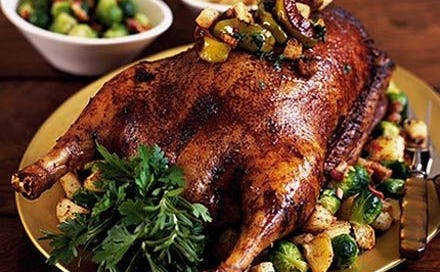Note: Written in the aftermath of my Canadian Thanksgiving earlier this year. Publishing today in case it’s helpful to my American readers!
At Thanksgiving dinner today, my dad brought up, out of nowhere, the question of whether we felt it was fine to swap races of people in historically-situated art - like casting a white actor as Othello or a black actor as Tom Sawyer. Receiving indirect, de-escalatory replies like “well, I thought the Hamilton casting choices were interesting” he grew more heated and demanded an answer to his original question. Our family is very polite and a bit conflict-averse, so the conversation petered off eventually, but I was left wondering - what on earth just happened?
This happens so regularly at our family dinners that my cousin’s family - who bore the brunt of my dad’s insistent questioning - brought it up as a kind of tradition. My family’s clearly not unique in this respect, either - there’s a meme in yuppie circles about the difficulty of keeping your mouth shut during Thanksgiving and Christmas as your backwards family spouts racist nonsense.
Except - this doesn’t really add up? My dad grew up in the Soviet Union where racial and gender equality were fundamental tenets of state religion long before they became so in the West. He’s more cosmopolitan and cultured, and has been to more strange places and met more strange people, than almost anyone I know. Most importantly, perhaps, my dad is way too smart not to know exactly what he was doing. So what was he doing, exactly?
I asked him some probing questions trying to get at the heart of the matter. Why did he bring it up? He “wanted to know how much my cousin’s family had absorbed the propaganda”. Why did he care about this? Because he felt, in his heart, that there was something weird going on with racial casting, and wanted to see if his family shared that feeling.
But couldn’t he tell, based on our evasive and de-escalatory replies, that we did think there was something weird about it, or at least that we could see what he meant, we just didn’t feel comfortable saying it at the dinner table? Probably. But he wanted to know something deeper - whether we would trust him with that truth, instead of going with what was polite. Perhaps a more direct way to communicate what he meant would be “I have this feeling, which I think you share, but I know is impolite to share in public. But here, in my house, with my closest people, do we feel safe enough to share it? Do we trust each other enough to share inconvenient feelings and truths, however trivial they seem? Can I be fully open with you?”
And the answer he got was a resounding no. We don’t feel safe enough. We don’t trust each other enough. Even in this close circle, we are prioritizing safety and politeness over being fully open with one another. It’s not really about Othello or Tom Sawyer, not about sexism or racism - these were just the canaries in the coal mine, and the canaries are in heaven now.
Now, was this a skillful way to navigate the situation? Will it help our family build the kind of deep trust that would let us share our feelings without filtering ourselves? Perhaps not. But it came from the right place, from a desire to orient us towards what really matters. I hope he brings up another controversial topic at Christmas dinner, and I hope we find it in ourselves to respond a bit more vulnerably.




This is a great point. Having a filter around your thoughts for social propriety all the time is cognitively expensive and it's nice to be able to shut that off. It's nice to find the group of people with whom this is possible.
"Now, was this a skillful way to navigate the situation? Will it help our family build the kind of deep trust that would let us share our feelings without filtering ourselves?"
The answer is yes. There has to be some real danger in the thing you're expressing otherwise it won't work. Political incorrectness is still dangerous and so it works. But the unit has to survive the conversation as well. You definitely won't feel safe if you bring up politics and then you get kicked out of future family dinners! So it seems the ideal situation is one where you have vigorous political conversation at family dinner but all other family functions (phone calls, dinners, financial aid etc) continue as before. That is, you need to be having conversations at family dinner that would certainly get you fired from your job. That's when you know you're free.
Never heard it put this way. It is somewhat a crazy indictment of how much politics has seeped into the glue of the family unit.